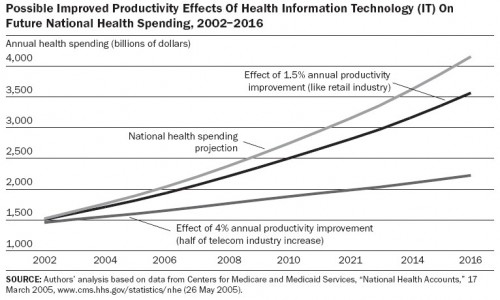It seems to be part of the American, if not human, condition that we expect technology to solve our problems. In a mid-September column in the Wall Street Journal, Stephen Soumerai and Ross Koppel reminded us of some aspirations for digital medical records or health IT (HIT). They recalled claims during the run-up to passage of the Affordable Care Act that digitizing would save $100 billion per year through health sector productivity increases. That's an audacious claim, only slightly more so than the $81 billion annual savings estimated by Richard Hillestad and colleagues in Health Affairs in 2005.
 Soumerai and Koppel proceed to illustrate why we should not be so confident that digital medical records would achieve anything like the savings some of their proponents claim. They cite a 2011 literature review of health IT as it applies to medication management by Daria O'Reilly and colleagues who conclude,
Soumerai and Koppel proceed to illustrate why we should not be so confident that digital medical records would achieve anything like the savings some of their proponents claim. They cite a 2011 literature review of health IT as it applies to medication management by Daria O'Reilly and colleagues who conclude,
The quality of the economic literature in this area is poor. A few studies found that HIT may offer cost advantages despite their increased acquisition costs. However, given the uncertainty that surrounds the costs and outcomes data, and limited study designs, it is difficult to reach any definitive conclusion as to whether the additional costs and benefits represent value for money. Sophisticated concurrent prospective economic evaluations need to be conducted to address whether HIT interventions in the medication management process are cost-effective.Relative to the half-life of health care cost savings ideas, this is an old debate. Jaan Sidorov (in 2006), the CBO (in 2008), and Catherine DesRoches et al. (in 2010) all pushed back against the notion that health IT would save money. I summarized their findings in a post at The Incidental Economist. Responding to Soumerai and Koppel, physician and health services researcher Ashish Jha blogged that asking if HIT saves money is the wrong question anyway. We need HIT tools to move the system forward and the right question is how to best put them to work.
The debate over whether we should have EHRs [electronic health records] is over. Can we fix our broken healthcare system without a robust electronic health information infrastructure? We can’t. Instead of re-litigating that, we need to spend the next five years figuring out how to use EHRs to help us solve the big problems in healthcare.The fact is, even though HIT raises costs on average, in some cases it doesn't. Why? Health economist David Dranove, blogging about his recent NBER paper, illuminates a contributing factor.
Our study articulates why we would expect heterogeneous effects of HIT and finds strong supporting evidence in the data. The key is to view HIT as a business process innovation. Like other such innovations, successful implementation requires complementary human capital. In other words, HIT does not operate itself. Skilled individuals must install it and train hospital personnel on how to use it. Hospital personnel must learn how to use the software and how to adapt it to their idiosyncratic needs. Not surprisingly, some individuals are better at this than others. We argue that complementary human capital is most abundant in areas where there is a strong general IT presence – think the Bay Area or Seattle. Thus, El Camino Hospital near Palo Alto was an early and successful adopter of HIT. At the same time, hospitals located near the headquarters of major HIT firms, are more likely to get better vendor support. Thus, hospitals in Milwaukee have been very successful with the Epic system. (Epic is located near Madison.) Finally, hospitals with experience with primitive HIT are likely better prepared to take advantage of advanced HIT.In the New York Times, Reed Abelson, Julie Creswell, and Griffin Palmer suggest another contributing factor: the extent to which hospitals use HIT as optimal evaluation and management coding assistants that auto-populate fields to trigger higher revenue. This is neither a new revelation, as John McDonough reports, nor shocking to those who understand what HIT does, as Margalit Gur-Arie expresses. If you're among the shocked, I recommend you augment whatever mental model you have of the US health system with the notion that, whatever it does, it also maximizes provider revenue. That may not be every provider's explicit objective -- I'm sure it is not -- but we have implicitly backed into it by having virtually no meaningful checks on the size of wallet biopsies. Drop HIT into such a system and, on average, it will do what the rest of its cogs do, increase spending. The first rule of the health system seems to be, if you build it, they will reimburse.